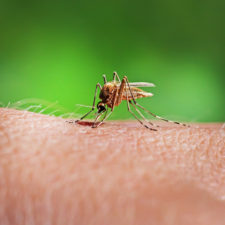 Mosquito via Shutterstock
Mosquito via Shutterstock
If you couldn't tell from all of the joyous children running around, the summer has begun. Unfortunately, that also means that it's the start of West Nile Virus season.
In just the last week, reports of cases have started to crop up -- three in Mississippi, one in Nebraska, another in Oklahoma. And, many more states may not have human cases yet, but have reported the presence of mosquitoes with West Nile.
So, what does this mean for us? Is this cause for concern, or just a lot of hype? The answer is somewhere in between.
First, some background. West Nile Virus was found in the United States in 1999, with 62 cases and seven deaths reported that year. Since then we have seen cases annually, and therefore we should work on the assumption that it's here to stay. The number of cases varies year to year, from the highest in 2003 (9,862) to only 21 in 2000.
If you are infected with West Nile, there are three very different possible outcomes. The good news is that most people who are infected (80 percent) have no symptoms. Those people are not included in the numbers above as they lie under the radar.
For the other 20 percent who have symptoms and visit a physician, there are two ways as to how the disease develops.
The first is called "non-neuroinvasive disease" and is characterized by symptoms such as a fever, headache, body aches, joint pains, vomiting, diarrhea and rash. It definitely won't be the best week of your life, but those who get it generally make a full recovery.
The second is called "neuroinvasive disease" and this is where the worry about West Nile sets in. In this case, people can be stricken with:
- meningitis (swelling of the meninges, the protective membranes covering the brain and spinal cord)
- encephalitis (inflammation of the brain)
- acute flaccid paralysis (a sudden weakness of muscles, or paralysis)
These three illnesses are characterized by the acute onset of:
- fever with stiff neck
- confusion
- agitation or hallucinations
- seizures
- double vision
- problems with speech or hearing
- sleepiness or difficulty waking
- disorientation
- sensitivity to light
- loss of consciousness.
If you are unlucky enough to have these symptoms as a result of your mosquito bite, it can be a tough road ahead.
That said, it's somewhat reassuring that, according to the CDC, the more serious (and sometimes fatal) neurologic illness occurs in less than 1 percent of infected people. In 2015, that equated to 119 deaths.
So, although I would not move West Nile Virus up to the top of your list of things to worry about, it has been the cause of over 1,800 deaths in the U.S. since 1999 -- and it is a good enough reason to take precautions against mosquito bites for the rest of the summer. The West Nile season peaks in August, and will be gone again by October. So if you start to feel feverish two-to-six days after getting bitten by a mosquito, it is not a bad idea to go and visit your physician.



